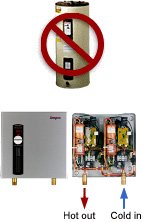How Tankless Water Heaters Work
Tankless water heater concept
The concept of tankless water heating is pretty simple - instead of heating water and storing it in a tank where energy is lost throughout the day, tankless systems heat water on demand, only as hot water is actually needed and used. This concept originated in Europe and Asia where tankless heaters have been used for decades. In the early 1990's, as energy prices started to rise in North America and as consumers began to pay more attention to "green" technologies, tankless water heating technology migrated to the U.S. and Canada. The early models, which were generally designed for low-flow point-of-use applications only, were not very sophisticated, but offered consumers on demand water heating and the opportunity to reduce their cost of water heating and associated environmental footprint.
Today's tankless water heaters are much more powerful and are capable of handling the demands of a whole household as well as many commercial applications. While there is a huge variation in technology, the general concept behind each unit is the same:
A flow sensor detects when you turn on a hot water faucet and activates the tankless water heater. A series of heating elements then heat the water and will continue to do so until the flow sensor recognizes that the water has stopped flowing (you turn the faucet off).
Since the heater only runs for a few minutes per day as opposed to cycling on and off all day long like a traditional tank-type water heater, a substantial reduction is energy costs can be achieved - generally 30 to 50%. Since a tankless water heater can literally run forever without running out of hot water, there is no need to overheat the water anymore as is done with conventional heaters to ensure they do not run out of hot water. This creates additional energy savings and reduces the formation of hard water scale. As a result of this, and the fact that full water pressure is maintained throughout a tankless heater, they are less prone to problems related to mineral and sediment build-up. Accordingly, they are backed by much longer warranties than conventional water heaters, and indeed, they do last much longer. Of course, due to their small size (about the size of a brief case, tankless water heaters also save space.
Despite the fact that all tankless water heaters are based on the same core concept of heating water on demand only as it is needed, there is a huge variation in technologies available, ranging from rudimentary on/off models, to heaters that offer automatic thermostatic control regardless of flow rates and the incoming water temperature. Accordingly, there are big differences in performance too.
We are pleased to offer the Stiebel Eltron line of tankless water heaters, including the renowned Tempra Series which offers the most sophisticated type of thermostatic temperature control technology presently available in the industry.
To learn more, select one of the options in the menu in the sidebar, or click next below:
Next: Compare technologies - what makes the Stiebel Eltron tankless water heater the best?

- Reduce water heating costs as much as 50%
- Never run out of hot water
- Reduced risk of scalding
- Longer life
- Less likely to leak or rupture
- Save space
| |||||||||||||||


